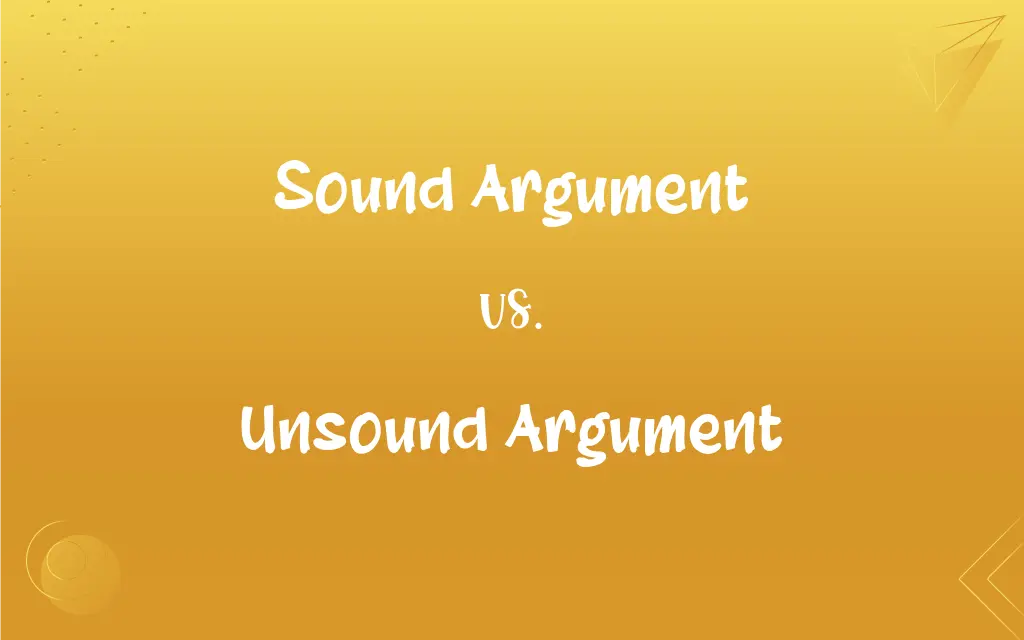Sound Argument vs. Unsound Argument: What's the Difference?
Edited by Aimie Carlson || By Janet White || Published on February 27, 2024
Sound Argument is a logical argument with true premises and a valid form. Unsound Argument is an argument that is either invalid or has one or more false premises.

Key Differences
A sound argument is not only valid in its logical structure but also has premises that are all true. Conversely, an unsound argument may contain false premises or may be logically invalid, rendering its conclusion unreliable.
In a sound argument, the truth of the premises guarantees the truth of the conclusion. In contrast, an unsound argument might lead to a false conclusion, either due to untrue premises or a flawed logical structure.
Sound arguments are a cornerstone in logical and critical thinking, ensuring that conclusions are based on factual and logical reasoning. Unsounded arguments, however, often lead to misunderstandings or misinformation due to their unreliable foundations.
Every valid argument with true premises is sound, making it a reliable tool in debate and reasoning. An unsound argument, even if valid in form, loses its persuasive power due to the falsehood of its premises or invalid reasoning.
The reliability and credibility of a sound argument make it a valuable asset in academic and intellectual discourse. An unsound argument, on the other hand, is often subject to criticism and scrutiny for its lack of logical consistency or factual accuracy.
ADVERTISEMENT
Comparison Chart
Premises
All premises are true.
Has one or more false premises.
Logical Validity
The argument is logically valid.
The argument may be logically invalid.
Conclusion Reliability
Conclusion is true if premises are true.
Conclusion may be false.
Role in Critical Thinking
Enhances logical reasoning and debate.
Often leads to misunderstandings or fallacies.
Persuasive Power
Highly persuasive due to its logical soundness.
Lacks persuasive power due to flaws.
ADVERTISEMENT
Sound Argument and Unsound Argument Definitions
Sound Argument
This type of argument is irrefutable due to its logical and factual foundation.
Theft is a crime; taking someone else's property without consent is theft; therefore, it's a crime.
Unsound Argument
An unsound argument has either false premises or invalid logic.
All birds can fly; penguins are birds; therefore, penguins can fly.
Sound Argument
It refers to a logically coherent argument with all true statements.
All birds have feathers; a penguin is a bird; thus, penguins have feathers.
Unsound Argument
It's an argument where the conclusion doesn't logically follow from the premises.
All students study; some children are students; therefore, all children study.
Sound Argument
A sound argument is logically valid with true premises.
All men are mortal; Socrates is a man; therefore, Socrates is mortal.
Unsound Argument
An argument not supported by facts or proper reasoning.
Drinking water is healthy; alcohol is a liquid; thus, drinking alcohol is healthy.
Sound Argument
It's an argument where the conclusion necessarily follows from the premises.
Two angles of a triangle always sum to less than 180 degrees; therefore, a triangle cannot have two right angles.
Unsound Argument
This argument type leads to unreliable conclusions.
It's sunny in Spain; Madrid is in Spain; therefore, it's always sunny in Madrid.
Sound Argument
A sound argument is both valid and factually correct.
Water boils at 100°C at sea level; this is water at sea level; hence, it boils at 100°C.
Unsound Argument
It might appear logical but fails due to untrue premises.
Cats are reptiles; all reptiles lay eggs; hence, cats lay eggs.
FAQs
Can a sound argument have false premises?
No, a sound argument requires all premises to be true.
What is a sound argument?
A sound argument is a logical argument where the premises are true and the reasoning is valid.
How do you determine if an argument is sound?
By verifying the truth of its premises and the validity of its logical structure.
Why is it important for an argument to be sound?
It ensures that the conclusion drawn is reliable and based on factual and logical premises.
Can a valid argument be unsound?
Yes, if it has one or more false premises, it's unsound despite being valid.
Is a sound argument subjective?
No, soundness is an objective measure based on truth and validity.
Can a sound argument change over time?
Yes, if the truth of its premises changes over time.
How can you identify an unsound argument?
By identifying false premises or flaws in the logical reasoning.
Are all unsound arguments obviously flawed?
Not always; some may appear convincing but are unsound upon closer examination.
Can an unsound argument become sound?
Yes, if its false premises are corrected and its reasoning is made valid.
Are emotional appeals examples of unsound arguments?
Often, yes, as they may rely on non-factual premises or illogical reasoning.
Can a sound argument have a false conclusion?
No, a sound argument by definition leads to a true conclusion.
Are all convincing arguments sound?
Not necessarily. An argument can be convincing yet unsound if based on false premises.
What is an unsound argument?
An unsound argument is one where either the premises are false, or the reasoning is invalid, or both.
Do unsound arguments always lead to false conclusions?
Not always; a conclusion can accidentally be true even if the argument is unsound.
Are scientific theories examples of sound arguments?
Often yes, as they are usually based on true premises and valid reasoning.
Is every invalid argument unsound?
Yes, invalid reasoning makes an argument unsound.
Can unsound arguments be useful?
They can be useful in identifying logical fallacies and improving critical thinking.
Can an argument be valid but unsound?
Yes, if it has a logical structure but contains false premises.
Can an unsound argument be persuasive?
Yes, especially if it uses rhetorical techniques or appeals to emotion.
About Author
Written by
Janet WhiteJanet White has been an esteemed writer and blogger for Difference Wiki. Holding a Master's degree in Science and Medical Journalism from the prestigious Boston University, she has consistently demonstrated her expertise and passion for her field. When she's not immersed in her work, Janet relishes her time exercising, delving into a good book, and cherishing moments with friends and family.
Edited by
Aimie CarlsonAimie Carlson, holding a master's degree in English literature, is a fervent English language enthusiast. She lends her writing talents to Difference Wiki, a prominent website that specializes in comparisons, offering readers insightful analyses that both captivate and inform.







































































